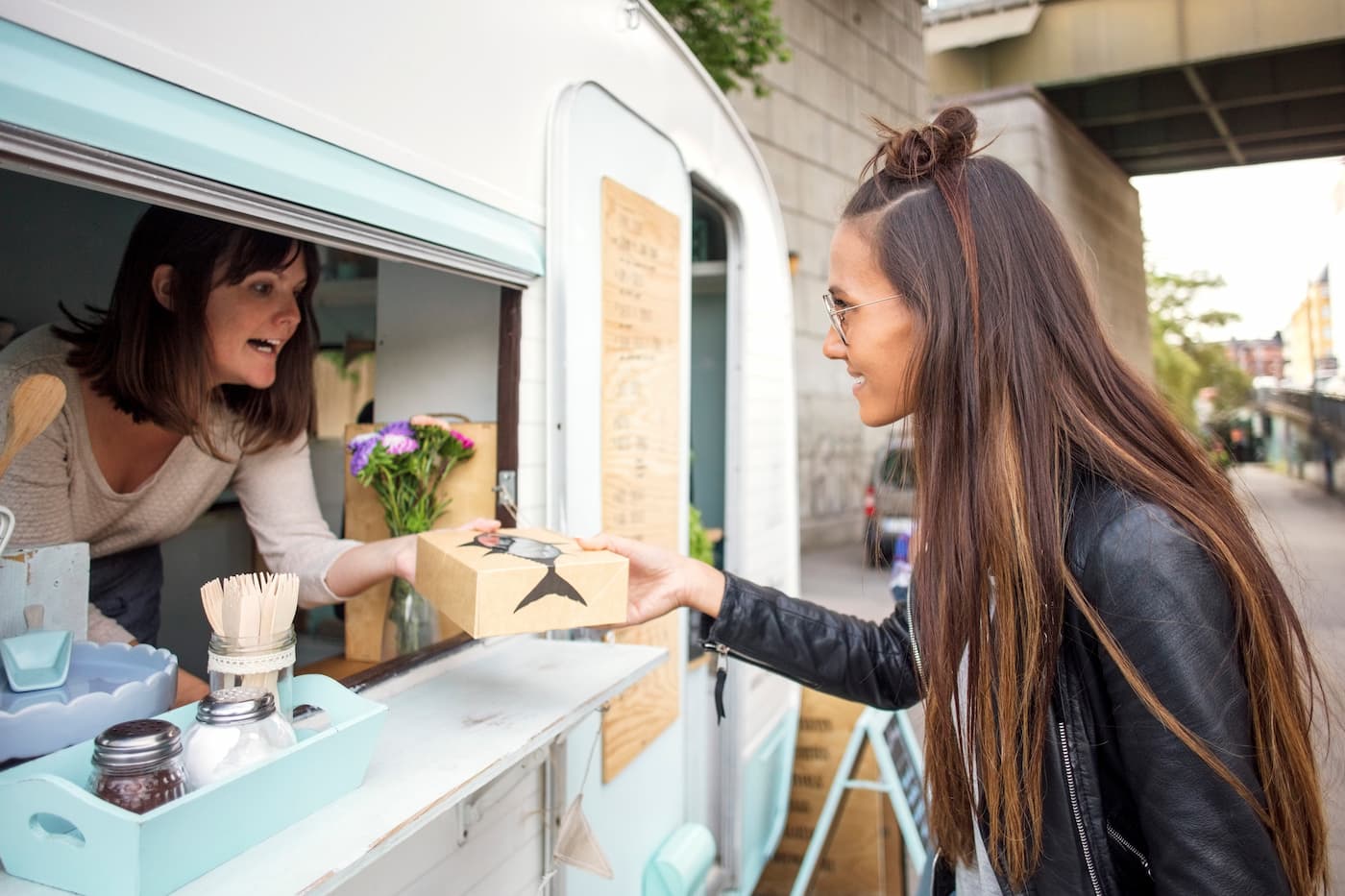5 reasons Clover is a best-fit POS for food trucks
Editorial Team
7 min read
Americans love food trucks, and for good reason. Aside from being quick and convenient, food trucks offer customers a novel and casual way to try some pretty amazing cuisine, including top-tier culinary experiences.
According to market analysis, food trucks are so well beloved that they represent a $2.2 billion industry in the U.S. and are projected for steady growth over the next five years.
Read on to learn how POS systems can help support the success of your food truck business as well as discover lessons from other food truck owners.
5 ways Clover devices can help your food truck thrive
Compact Clover POS devices keep food trucks nimble and customer lines flowing. We’ll start with our top five reasons Clover could be the perfect fit for your food truck business.
1. Save space
In a food truck, every inch of space matters. Between food preparation, customer hand-off, and the driver’s seat, there’s simply no room for a back office or bulky register. With a compact restaurant POS or, even better, a handheld device like the Flex, you get lots of POS power packed into mere inches. That means, space is one thing you won’t have to worry about.
2. Cash-in on online orders
Online ordering has kept many food businesses afloat. If you’re looking into online ordering for food trucks, Clover can get you up and running fast. Offer your customers online ordering any way they want it–pickup or delivery. It’s easy to set up and fully integrated into Clover, even on compact devices.
3. Stay connected to loyal customers
A true food truck fan knows that tracking its schedule and location is all part of the fun. Let customers know where and when you’ll be parked with emails through Clover’s Customer Engagement tools. In addition to sharing your location, you can use direct email to run promotions, announce new menu items, and publicize special events and innovations. What’s more, Clover makes light work of loyalty rewards management, such as punch-card style programs that add up with each visit.
4. Keep business on the road
With Clover’s roster of features for invoicing, reporting, employees, inventory, and more, you can handle all your business operations on-the-go—yes, even inventory. That means, maximum mobility for busy food truck owners.
5. Get creative
With the flexibility of Clover’s most compact devices, you can get super creative with how—and where—you serve customers. Take these restaurateurs, for example. Each shares an interesting story about how they took their business to the streets and reached new customers. Whether you decide to add tables outside your truck, join a food pod, open a permanent location, or host outdoor game or movie nights, you’ve got maximum flexibility with a Clover POS.
What food truck owners can teach any small business
For chefs and entrepreneurs looking to enter the restaurant world, food trucks represent opportunity and often serve as a launch pad for building their restaurant empires. Thanks to minimal overhead expenses, food trucks provide the flexibility for owners to express themselves, test and learn, all while gaining valuable skills through on-the-ground marketing.
The fact is, small business owners can learn a ton from food trucks about how to start a small business or take it to the next level. And, their lessons apply whether your business is on wheels or not.
1. If you’re in, be all in
Anyone who’s considering starting a small business of any kind should know that there are no half measures. The time, energy, and money it takes to start a brand and build a business means that you’re either in or you’re out, and you need to truly believe in what you’re doing.
Before starting Holy Rolly, a truck serving made-from-scratch rolled ice cream in Charleston, South Carolina, LaToya Gardner and her husband were working in corporate America. “He worked in retail management, and I worked in financial services,” she explained to Clover. “After we had our kids, we were both looking for something that allowed us to have more flexibility.” The two self-professed “ice cream fanatics” decided to make a bold move into the ice cream game, knowing that they could offer something truly unique in their area.
“We decided to go all in, and we both quit our jobs,” says Gardner. “We decided to focus all of our energy, time, and attention into building our business, because we truly believed and saw the potential in our idea. In fact, it was a full-time job just getting a custom truck fabricated, developing our branding, and of course, tasting and developing all of our flavors!”
2. Be community-minded and rooted in generosity
Small businesses are also local businesses, and have deep roots in the communities in which they operate. Many small businesses have found unique and powerful ways to give back to their local communities, and food trucks are no different.
“For about 10 years, I had a soup kitchen and a food pantry, and I would feed about a thousand people a month,” said Jeanette Lopez Georgiti, founder of the Salty Sistas food truck in Sneads Ferry, North Carolina. “I was constantly trying to raise money to be able to provide for the people in need in our area.”
After years of fundraising, Georgiti got the idea to start a for-profit business with the intention of funding her charitable efforts. “I love cooking,” said Georgiti. “Any time I’m upset or stressed out, I just spend so much time in the kitchen. So, I got a food truck. I thought it was going to be a great way to get out there and then pick a local charity each month that I could give back to. And it was!”
The venture was so successful that after only three months Georgiti was able to expand her mobile venture to a brick-and-mortar store without losing focus on giving back.
3. Don’t be afraid to start small
Before it was a popular Georgia-based food truck and catering company, Rollin’ Smoke BBQ was just three men on a competitive mission.
“When I was younger, my uncle, a family friend, and I started out as a backyard BBQ competition team,” said owner Dejuan Smith. “We competed locally and traveled around to different states. Our skills and our name grew from there.”
In 2010, Smith and his partner Taneesha Thomas decided to pursue a barbecue business more seriously. They started out in a backyard, without even a truck, serving prepared food to locals.
“We call it our ‘prime real estate’ because we’ve built our brand in this location,” explained Thomas. “When Dejuan started out, with no truck or anything, he would bring already cooked food here; now, our food truck lives here most of the time.”
On-the-go devices served just the way you want them
Whether you’re pulling up to local outdoor events or staking a corner in a bustling business district, one of the keys to running a successful food truck is staying nimble and versatile. And that kind of versatility is just what Clover serves up every day.
Clover offers a range of compact mobile devices, suited to help food trucks meet the needs of their business.
- The Clover Mini is a space-saving, fully integrated point-of-sale system, streamlining form and function. It enables merchants to accept all forms of payment, track inventory, manage staff, launch customer rewards, and more in less space than most laptop computers.
- The handheld Clover Flex accepts orders and payments anywhere. That means, you can meet your customers in line and keep tickets flowing in front of and behind the counter.
Why wait? Elevate your business and get started with Clover POS systems today.
Related Posts
How to start a cleaning business
Full Service Restaurants (FSR)
Launching your restaurant right
Popular Topics
Stay In Touch
Sign up and learn more about Clover.
Thank you for your subscription!
Recent Stories
- How to buy a restaurant
- How to evaluate employee performance like an enterprise company
- Dropshipping: What it is & why it might be smart for your small business
Please share your contact information
to access our premium content.
Thank you for sharing your contact information.
Download Now





